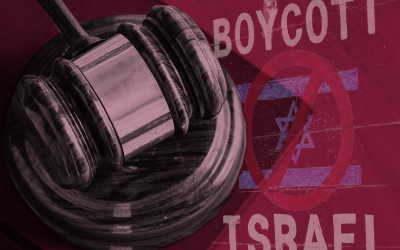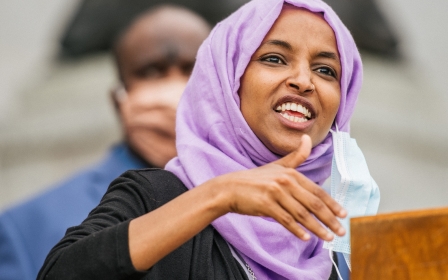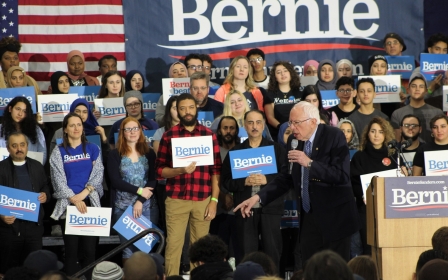Democrats' platform to denounce BDS but stress right to free speech

Before presidential elections, both major parties in the United States release platforms outlining their vision for the country over the next four years.
This year, progressive activists have been pushing for foreign policy language that prioritises human rights around the world, including in Israel and the Palestinian territories. Many were disappointed on Thursday, following reports that a draft of the section on the Middle East conflict does not even mention the word "occupation".
Still, advocates say progress was made on the right to boycott Israel. The document stresses protecting free speech despite voicing opposition to the Boycott, Divestment and Sanctions movement, in an apparent blow to those who promote anti-BDS laws.
The proposed document, advanced in a preliminary vote on Wednesday says the Democratic National Committee (DNC) rejects efforts to "delegitimise" Israel through BDS or at the United Nations, "while protecting the constitutional right of our citizens to free speech".
James Zogby, president of the Arab American Institute (AAI) said "as slight as" that disclaimer may appear, it is a big step in the right direction.
Dozens of US states - including many where Democrats are in power - have laws that restrict the right to boycott when it comes to Israel.
'Even those who support Israel... they see Israel as a state that is drunk with power, and the United States continue to provide them the liquor'
- Sam Hindi, DNC delegate
The 2016 DNC platform included similar language around BDS, but without the caveat on free speech.
"We tried to get that free speech exception in 2016. They wouldn't do it. Now they've done it, so I'm going to pocket that as a victory," said Zogby, who was named to the platform committee by Senator Bernie Sanders in the presidential election cycle.
The BDS section of the 2020 draft platform, which was first revealed by Jewish Insider, mirrors comments by Joe Biden's adviser Tony Blinken, who told a group of Arab-American activists last week that the former vice president would "protect the constitutional right of our citizens to speak freely".
Blinken cited Biden's opposition to Israel's ban on congresswomen Ilhan Omar and Rashida Tlaib over their support for BDS.
Anti-BDS laws
Free speech advocates, including the American Civil Liberties Union (ACLU) have long decried laws that aim to restrict BDS as a violation of the First Amendment of the US Constitution.
The sentence on respecting the right to boycott effectively puts Democratic leaders who support anti-BDS laws at odds with their own party platform.
For example, Michigan's Democratic Governor Gretchen Whitmer - a national co-chair for the Biden campaign - vowed during her gubernatorial campaign in 2018 to uphold the anti-BDS law approved by her Republican predecessor Rick Snyder.
"I strongly support the bipartisan anti-boycott legislation that was signed into law by Governor Snyder last year and will do everything in my power to uphold it as Michigan’s next governor," Whitmer said at the time.
Federal courts have found anti-BDS laws in Kansas, Arizona and Texas, which required state contractors including some teachers to sign pledges that they won't boycott Israel, to be unconstitutional.
On Thursday, reports that the party platform will not mention the occupation of Palestinian territories, while reasserting support for US military assistance to Israel, prompted calls from progressive groups and Democratic delegates for revising the draft.
The platform, a non-binding set of priorities that outline the party's policies, is set to be ratified at the Democratic national convention next month.
Delegates, who are chosen at the local level after state primaries are set to nominate Biden as the party's presidential candidate, but it remains unclear in what form the convention will be held amid the spread of the coronavirus.
On Thursday, 220 Democratic delegates from across the country penned a letter to the platform committee calling for withholding aid to Israel if it proceeds with its annexation plans.
Citing recent surveys, a statement accompanying the letter stressed that the Democratic base rejects unconditional support for Israel.
"The letter comes as 71% of Democrats oppose Israel’s annexation plan, 70% support an independent Palestinian state, and 81% believe that Congress should question the U.S.-Israeli relationship," the statement said.
It expressed support for progressive lawmakers who pledged late in June to impose human rights conditions on US aid to Israel - worth $3.8bn annually - if it goes through with annexation.
"The billions we give unconditionally to Israel could be spent on domestic priorities and social programs benefiting our most marginalized communities in the United States, which is especially important today as millions of Americans suffer without healthcare, jobs, education, and housing amidst a global pandemic."
Progressive groups push back
Sam Hindi, a DNC delegate from California who co-authored the statement, said annexation would be a "final blow" to the prospects of a peaceful two-state solution to the conflict.
He said if Washington continues its aid to Israel, it would be effectively endorsing abuses against Palestinians.
"Unconditional assistance is counterproductive to where we stand as a nation and our values for human rights and self-determination," Hindi told MEE.
He added that the statement merely asks the party to uphold its own stated principles in support of equality and human rights.
"We're not really asking for the Democratic Party to move away from the core values," Hindi said.
"These are the values that we as Democrats carry on and hold and are proud to announce in our platform. The only exception that seems to be striking almost every time is the Palestine issue."
The DNC delegate highlighted that upholding international law is not an anti-Israel stance.
"Even those who support Israel for the most part, but are honest with their evaluation of what's going on, they see Israel as a state that is drunk with power, and the United States continues to provide them the liquor," Hindi said.
"We have a moral obligation to say: This is illegal; this is against our core values; and we will not provide unconditional aid to Israel if it continues on this path."
Hindi said it was critical for the Democratic Party to acknowledge the occupation of Palestinian territories or risk jeopardising its credibility on the issue. "We cannot be taken seriously if we are not addressing the situation as it is. Just burying our heads in the sand does not make the occupation go away."
For his part, Zogby vowed that organisers would continue to push for including the word "occupation" in the platform.
"We're concerned about the word 'occupation', and we're doing everything we can to see that occupation is clearly mentioned after 53 years of 'occupation' and after virtual consensus among Democratic leaders that occupation is bad," Zogby told MEE.
Twelve progressive groups, including IfNotNow, Demand Progress, Justice Democrats, Jewish Voice for Peace Action and CodePink also decried the failure to denounce annexation in the platform draft.
"Condemning the Israeli occupation by name should be the bare minimum for any leader of the Democratic Party," the groups said in a statement.
"For years, those opposed to self-determination and basic human rights for Palestinians have controlled the terms of the debate in order to shield the Israeli government from consequences for its ongoing human rights violations against Palestinians.
"Democrats should commit to building a future in which all Palestinians and Israelis live under full equality by upholding a foreign policy that centers human rights and dignity for all people."
The organisations stressed that omitting the "fundamental reality that Palestinians face" - at a time of rethinking America's priorities in light of the Black Lives Matter protests - is out of touch with Democratic voters.
'Issue of racial justice'
At a virtual meeting for a Democratic platform panel on Wednesday, Sanders' adviser Josh Orton delivered impassioned remarks in favour of condemning the occupation, urging Democrats to uphold the American "values of human and civil rights".
"Ending the occupation is an issue of racial justice," Orton said.
"At a time when hundreds of thousands of Americans have been marching in our streets for equality and civil rights, it is absolutely necessary for the Democratic Party to speak truthfully to the Palestinians efforts to secure those same rights."
Orton, who introduced himself as a Jewish American who strongly supports Israel, said the fact that Palestinians are living under occupation is "no longer a matter of serious dispute".
"A growing and just movement within our party believes that US aid should not be used to facilitate annexation and violate Palestinians' rights," he said.
Julianne Smith, a former official in the Obama-Biden administration who is on the platform panel, followed Orton's comments by praising the "unity" around the language regarding the conflict.
She said the section on Israel-Palestine is "perfectly in line with Vice President Biden's own convictions."
"Our commitment to Israel's security, its right to defend itself and to our alliance is and ought to remain absolutely ironclad," Smith said. "But so, too, should our commitment to bring this conflict, which has caused so much pain to so many, to an end," Smith said.
With progressives openly voicing dissatisfaction with the draft, it is not clear that Democrats are as united around the proposed platform as Smith suggests.
Maya Berry, AAI's executive director, called for further discussions on the foreign policy section, warning that passing the draft without more debates would not conceal disagreements.
"The story of this platform - if it doesn't change - is not going to be about 'we didn't have a foreign policy discussion, therefore, it wasn't divisive'. Not at all. The story is going to be written about how out of touch the Democratic Party is with its own base," Berry told MEE.
Middle East Eye propose une couverture et une analyse indépendantes et incomparables du Moyen-Orient, de l’Afrique du Nord et d’autres régions du monde. Pour en savoir plus sur la reprise de ce contenu et les frais qui s’appliquent, veuillez remplir ce formulaire [en anglais]. Pour en savoir plus sur MEE, cliquez ici [en anglais].







